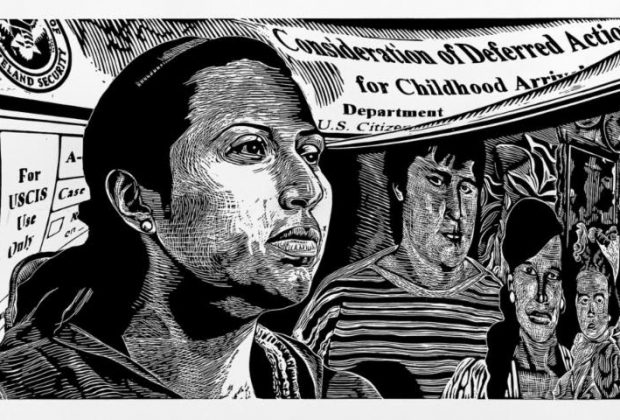By Tal Kopan - CNN (November 17, 2017)
Prepare for a December sprint
The past few months since Trump announced the end of DACA have been spent largely on getting organized for the real negotiation crunch time.
Several groups, with a range of formality, have been meeting and having conversations in both chambers and on both sides of the aisle.
In the House, there's Speaker Paul Ryan's working group, made up of key committee chairs and leaders on immigration from a wide range of viewpoints, but there are also other offshoot efforts, including the Problem Solvers Caucus and conservatives like the Freedom Caucus.
In the Senate, similarly, Senate Majority Whip John Cornyn and Judiciary Chairman Chuck Grassley are leading talks with other leading Republicans from across the spectrum.
Democrats have largely staked their request on a "clean" Dream Act, which simply isn't going to happen, but have also acknowledged they will likely need to agree to some border security. Just what they can live with, though, hasn't fully been decided.
Senate leading the way
The House talks have thus far not produced a clear path forward, and attention is increasingly turning to the Senate to lead the way.
Senate Minority Whip Dick Durbin is the Democrats' chief emissary on this, and he and Republican Sen. Lindsey Graham have been in very close contact throughout this process. But Graham himself lacks the juice to get DACA through his party, thus the Cornyn-Grassley talks.
Republicans have started to coalesce around a proposal that isn't quite as far right as the White House immigration priorities, but is still something Democrats will hate, including elements of Cornyn's border bill and an effort to cut back on "chain migration," or family-based visas. As of now, it appears to be an opening offer as both sides stake out their negotiating position.
When's the deadline?
Right now, it's shaping up as end of the year.
March 5, 2018 may be the day that Trump intended for DACA permits to begin expiring, but most members of Congress who want to save DACA are pushing for something by the end of December. Not only are they concerned about waiting until the last minute, but experts also warn that any program will need implementation time, and recipients could be at risk in the interim.
Democrats are also fully aware that their best, and likely only, leverage on this is with government funding, which runs out in mid-December.
The Senate will need 60 votes and Ryan likely will need Democrats in the House to make up for spending hawk defectors to pass the spending bill.
House Minority Leader Nancy Pelosi and Senate Minority Leader Chuck Schumer have yet to echo their left flank yet that they will take it to a government shutdown if they don't get DACA, but they're definitely not ruling it out. Pelosi said she doesn't expect Democrats will go home for Christmas without a DACA resolution.
"Kicking the can to next year is just to say, 'We're not doing this,'" Pelosi saidThursday.
This is going to be a serious game of chicken up until funding is resolved.
Democratic Rep. Zoe Lofgren, a key immigration leader for Democrats, summed it up for me thusly the other day.
"They have the majority, if they have the votes, they can just go ahead. If they need Democrats, then there's things we're going to look at. I mean, we don't have an S-CHIP bill, we don't have any resolution for the DACA kids, we don't have a resolution for the subsidies, for the Affordable Care Act, there's a number of things they've screwed up, and that we need some resolution on."
What happens next?
Forget all the working groups when we get to crunch time. This has all the makings of a leadership decision.
There's been suspicion for some time that Ryan formed his working group to pave the way for him to make a game-time decision, allowing him to say: We gave it an honest try, folks, but here's how we have to move forward now. That's not to say the group didn't make an effort and there wasn't hope there could be a deal, it just was never very likely to have something that Rep. Bob Goodlatte and Rep. Mario Diaz-Balart and everyone in between were all going to fully agree on.
Expect after Thanksgiving, and after we get some clarity on tax reform (which is a big wild card in this, of course), that leadership and a few key members of either party to get down to nuts and bolts of what they can and can't live with.
Who are the key players?
Ryan, Pelosi and their teams in the House, plus veterans of this fight like Goodlatte, Diaz-Balart and Mike McCaul, and representatives of other factions like the Freedom Caucus, Republican Study Committee and Tuesday Group.
On the Senate side, Chuck Schumer and Mitch McConnell are obviously engaged, but this is really going through Durbin, John Cornyn, Chuck Grassley and Lindsey Graham. Watch a few other Republicans on this, too, including moderates like Thom Tillis and James Lankford and hardliners like Tom Cotton. On the left, keep an eye on California Democrat Kamala Harris. She's new to this fight in Congress, but California has the highest number of DACA recipients in the country, and she happens to be a progressive favorite, who was the first senator to publicly state she wouldn't support government funding without progress on DACA.
And last but not least, Trump himself. "You don't need a discharge petition. It'll take one presidential tweet and we'll get the bill out," said Texas Rep. Joe Barton at a GOP press conference rallying for a DACA fix the other day.
That is a commonly held feeling in Congress, but it goes both ways. Trump could make this a lot easier or a lot harder, depending on how he wants to play it. But there's also a strong expectation that if Congress can actually pass something, he'll sign it and be happy with a win.
What could go wrong?
It's Congress -- everything could go wrong.
The Senate group has mostly taken mandatory worker verification (e-verify) off the table, which is one of the biggest nonstarters there is.
But there's still a lot of interest in doing something on "chain migration," or restricting the family members who can be sponsored to come to the country (a pet issue of Trump's). It's not impossible for Dems to agree to something on that, but it's tough.
Other potential issues: How much Republicans want a "wall" vs. border "security" like technology and infrastructure, how hard they push for interior enforcement ("deportation force" to Dems) and also issues like sanctuary cities and criminal penalties.
How likely is a deal?
Today, it's a toss-up.
The news in favor of a deal is that a clear majority of Congress (and it seems the President) really wants to see something done. The trick is, they don't quite all agree what that something is and no one has blinked yet on what they can stomach that they don't love.
Diaz-Balart had a good summary of what he calls the "complexity" of reaching a deal yesterday (though he is sworn to silence on the working group's specific efforts), but he still leaves it at a "possibility" that the finish line gets crossed.
"It would be easy potentially to do something that gets 218 Republicans in the House, potentially easy -- that doesn't get out of the Senate. It would be theoretically easy to get something with mostly Democratic votes, but it clearly wouldn't pass the House nor would it get a presidential signature," he said. "The good news is there are a lot of conversations, real serious conversations, by a myriad of different folks who are talking in good faith. ... Do I think there's a possibility of doing something? Yes. Are we there? No. Can we get there? We have to."
Source: Tal Kopan - CNN







